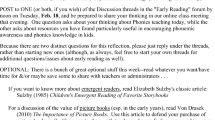Abstract
Web-accessible conferencing softwareand ``conversational ethics'' drawn from Habermas andRawls have successfully brought together on-lineparticipants separated by geography and viewpoint, andoccasionally resulted in consensus regarding otherwisedivisive issues such as abortion. The author describessuccesses, limitations, and costs of incorporatingthese technologies and discourse ethics in a religiousstudies class. Results are striking, but thepedagogical benefits involve technical risks and highlabor and time costs. This experience, coupled withrecent research, suggests that electronic pedagogies,like other teaching strategies, work for some, but notall students: this argues that we take up electronicteaching as one approach among many.
Similar content being viewed by others
References
Anderson, D., R. Cavalier and P. K. Covey. A right to die? The Dax Cowart Case [CD-ROM]. London: Routledge, 1996.
Barnette, R. “Teaching Philosophy in Cyberspace”. In The Digital Phoenix: How Computers are Changing Philosophy. Eds. T. Bynum and J. Moor, Oxford: Blackwell, 1998, pp. 323–331.
Bass, R. and B. Eynon. New Media Technologies and Faculty Development: Curricular and Learning-based Models. American Association of Higher Education Conference. San Diego, January 21, 1999.
Boettcher, J. V. “How Much Does It Cost to Develop a Distance Learning Course? It All Depends...”. Syllabus, 11(9) (May, 1998), 56–58.
Cavalier, R., P. K. Covey, E. A. Style and A. Thompson. The Issue of Abortion in America [CD-ROM]. London: Routledge, 1998.
Crane, G. (Ed.). Perseus 2.0: Interactive Sources and Studies on Ancient Greece [CD-ROM]. New Haven, CT: Yale University Press, 1996.
Ess, C. “The Pedagogy of Computing: Hypermedia in the Classroom”. In Hypertext '91: Third ACM Conference on Hypertext Proceedings. New York: Association for Computing Machinery, 1991, pp. 277–289.
Ess, C. “The Political Computer: Hypertext, Democracy, and Habermas”. In Hyper/Text/Theory. Ed. G. Landow, Baltimore: Johns Hopkins Press, 1991, pp. 225–267.
Ess, C. “The Political Computer: Democracy, CMC, and Habermas”. In Philosophical Perspectives on Computer-Mediated Communication. Ed. C. Ess, Albany, NY: State University of New York Press, 1991, pp. 197–230.
Ess, C. and R. Cavalier. “Is There Hope for Democracy in Cyberspace?” In Technology and Democracy: User Involvement in Information Technology. Eds. D. Hakken and K. Haukelid, Oslo, Norway: Center for Technology and Culture, 1997, pp. 93–111. (An early version of this paper is available on-line, <http://www.lcl.cmu.edu/CAAE/Home/Forum/report.html>.)
Fodor, J. “Teaching of Philosophy with Multimedia”. In The Digital Phoenix: How Computers are Changing Philosophy. Eds. T. Bynum and J. Moor, Oxford: Blackwell, 1998, pp. 354–358.
Habermas, J. “Discourse Ethics: Notes on Philosophical Justification”. In Moral Consciousness and Communicative Action. Cambridge: MIT Press, 1990, pp. 43–115.
Marincovich, M. and J. Nash. Radicalizing the Vision: Pushing the Boundaries of Instructional Technology Through Outcomes Assessment. American Association of Higher Education Conference, San Diego, January 22, 1999.
McKibben, B. The Age of Missing Information. New York: Penguin, 1993.
Romiszowski, A. “The Hypertext/Hypermedia Solution-But What Exactly is the Problem?” In Designing Hypermedia for Learning. Eds. D. Jonassen and H. Mandl, Berlin: Springer-Verlag, 1990, pp. 321–354.
Self-Knowledge (Atmabodha). (Swami Nikhilananda, Trans.). New York: Ramakrishna-Vivekananda Center, 1946.
Smith, K. L. and L. Baer. Myths and Realities of Technology-enhanced Education: The Impact on Faculty. American Association of Higher Education Conference, San Diego, January 23, 1999. (See also: <pegasus.cc.ucf.edu/~klsmith>.)
Splichal, S., A. Calabrese and C. Sparks (Eds.). Information Society and Civil Society: Contemporary Perspectives on the Changing World Order. West Lafayette: Purdue University Press, 1994.
Tremblay, G. “The Information Society: From Fordism to Gatesism”. Canadian Journal of Communication, 20(4) (1995), 461–482.
Turkle, S. “Virtuality and Its Discontents: Searching for Community in Cyberspace”. The American Prospect, 24(1) (1996), 50–57.
The Song of God: Bhagavad-Gita. (Swami Prabhavananda & C. Isherwood, Trans.). New York: New American Library, 1972.
Yoga: Discipline of Freedom (The Yoga Sutra Attributed to Patanjali). (B. Miller, Trans.). Berkeley, CA: University of California Press, 1995.
Author information
Authors and Affiliations
Rights and permissions
About this article
Cite this article
Ess, C. Wag the Dog? Online Conferencing and Teaching. Computers and the Humanities 34, 297–309 (2000). https://doi.org/10.1023/A:1002075505432
Issue Date:
DOI: https://doi.org/10.1023/A:1002075505432




